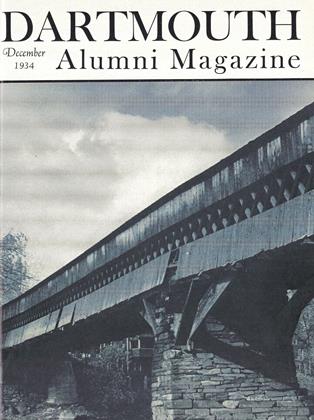This is the part of the school year that is so decisively broken into sections, one of which seems to follow the other in all too rapid succession. First Fall House Parties, followed by three weeks of classes, then Thanksgiving, with only three more weeks until Christmas vacation, and upon returning in January, only a breathing spell until final exams. House Parties came and passed quickly, but they were marked by success in more ways than one. Six hundred and some feminine guests descended upon Hanover on the weekend of the New Hampshire game—one for every four Dartmouth men, which is not necessarily a figurative equation if judged in the light of some of the stories of "snaking" that were smilingly passed around on the conclusion of week-end activities. It was a record number for House Parties, and another setback for Old Man Depression.
All plaudits, too, are due to the new room and house party regulations and those instrumental in devising and putting them into operation. Reports of week-end conduct were highly encouraging. No brawls or accidents that we heard of, and no lily-white forms pedaling down Main Street clothed in Sunday morning's dawn. The fraternity and dormitory committees recently appointed to supervise student conduct took their responsibilities seriously and received excellent cooperation from the undergraduate body. President of Palaeopitus George Colton, who with other white hatters made check-up rounds of fraternity and dormitory activities on both nights, states that the thing most surprising to him was the controlled drinking. "Everyone seemed to be drinking," he said, "and almost every house had a bar running most of the night, but all imbibing appeared to be in the most reserved and gentlemanly manner."
One incident to rumple the calm of the week-end, however, had to do with the separation of two undergraduates from College, one of them for circling around the front of Robinson Hall and destroying a fifty cent Dartmouth Player's sign under the eyes of Police Chief Hallisey, and the other for being drunk and showing up at the Station House to try to get the first, his friend, out of jail. There were other factors to be included—the second undergraduate's previous none-too-good record, and the unwillingness on the part of the Administration to overlook the first violations of the new rules to come before them and thereby set a precedent that might seriously weaken the application of these rules. But it was pretty strong punishment for the two culprits, and some measure of their indignation and that of their friends seems justified.
 View Full Issue
View Full Issue
More From This Issue
-
 Article
ArticleHANOVER BROWSING
December 1934 By Herbert F. West '22 -
 Class Notes
Class NotesClass of 1914
December 1934 By Edward Leech -
 Class Notes
Class NotesClass of 1911
December 1934 By Prof. Nathaniel G. Burleigh -
 Class Notes
Class NotesClass of 1918
December 1934 By Allan C. Gottschaldt -
 Article
ArticleHIS EXCELLENCY, THE GOVERNOR
December 1934 By Prof. Herbert W. Hill -
 Class Notes
Class NotesClass of 1910
December 1934 By Harold P. Hinman
Milburn McCarty IV '35
-
 Article
ArticleTHREE TYPES OF HOUSES
November 1934 By Milburn McCarty IV '35 -
 Article
Article"SANE OPTIMISM"
November 1934 By Milburn McCarty IV '35 -
 Article
ArticleMILESTONES
November 1934 By Milburn McCarty IV '35 -
 Article
ArticleLIQUOR STORE IN HANOVER
December 1934 By Milburn McCarty IV '35 -
 Article
ArticleELEAZAR-WHO??
January 1935 By Milburn McCarty IV '35 -
 Article
ArticleNO "CAMPUS OPINION"
April1935 By Milburn McCarty IV '35
Article
-
 Article
ArticleThayer and Tuck Graduations
June, 1911 -
 Article
ArticleTHE DARTMOUTH BATTALION AND PREPAREDNESS
May 1916 -
 Article
ArticleMEETING OF ALUMNI COUNCIL
AUGUST, 1928 -
 Article
ArticleSubject of Sketch
December 1946 -
 Article
ArticleAlumni Articles
JANUARY 1963 -
 Article
ArticleHistory Professor Douglas Haynes
February 1993 By Karen Endicott

